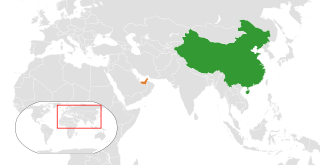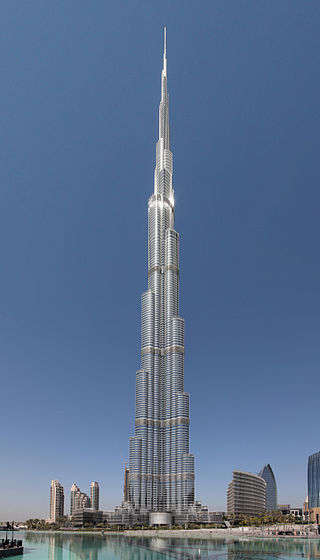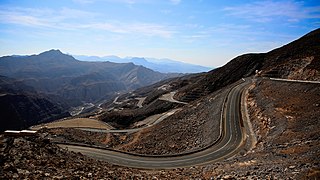Related Research Articles

The United Arab Emirates is a high-income developing market economy. The UAE's economy is the 4th largest in the Middle East, with a gross domestic product (GDP) of US$415 billion in 2021-2023.

The United Arab Emirates (UAE), or simply the Emirates, is a country in West Asia, in the Middle East, at the eastern end of the Arabian Peninsula. It is a federal, elective monarchy composed of seven emirates, with Abu Dhabi as its capital. It shares land borders with Oman to the east and northeast, and with Saudi Arabia to the southwest; as well as maritime borders in the Persian Gulf with Qatar and Iran, and with Oman in the Gulf of Oman. As of 2024, the UAE has an estimated population of over 10 million, of which 11% are Emiratis; Dubai is the most populous city and is an international hub. Islam is the official religion and Arabic is the official language, while English is the most spoken language and the language of business.
Najat Makki is an Emirati visual artist. She is a member of the Dubai Cultural Council. and one of the pioneers in Emirati contemporary art scene.

The Emirate of Abu Dhabi is one of seven emirates that constitute the United Arab Emirates. It is the largest emirate, accounting for 87% of the nation's total land area or 67,340 km2 (26,000 sq mi).
The earliest written record of Dubai (Dibei) is accredited to Muhammad al-Idrisi, who mapped the coast of the UAE in the tenth century AD. Circa 1580, the state jeweler of Venice, Gasparo Balbi, documented the pearling industry of Dubai and other cities currently presiding in UAE territory. Though traditionally conservative, the UAE is one of the most liberal countries in the Gulf, with other cultures and beliefs generally tolerated. Politically it remains authoritarian, however, relations with neighbouring Iran have been tense because of an ongoing territorial dispute over Gulf islands. The UAE was one of only three countries to recognise Taliban rule in Afghanistan.
According to Human Rights Watch, there is substantial discrimination against women in the United Arab Emirates. The status of women has improved over the years. UAE performs better on metrics of gender equality than many other states in the Gulf region, and it has been making reforms to protect women's rights and empower women in different sectors. Critics describe some of these reforms as window dressing.

The Emiratis are the citizen population of the United Arab Emirates. Within the UAE itself, their number is approximately 1.15 million.
Mass media in the United Arab Emirates is subject to government control and censorship. Media freedom is severely curtailed in the UAE. Most UAE media is owned by the government or by groups that have ties to the government. UAE law permits the government to censor content critical of the government. Journalists and writers who criticize the government are subject to repression.
Indians in the United Arab Emirates constitute the largest part of the population of the country. Over 3,860,000 Indian expats are estimated to be living in the United Arab Emirates, with over 38% of the country's total population and the fourth highest number of overseas Indians in the world, after the United States, Saudi Arabia, and Malaysia. Indian contact with the emirates that now constitute the UAE dates back several centuries, as a result of trade and commerce between the emirates and India. The UAE has experienced a tremendous increase in the population of resident Indians who initially migrated to the country as a result of opportunities in petroleum. Now, Indians are key to the UAE's construction, retail, financial services, healthcare, manufacturing and transport sectors. A sizeable minority of Indian migrants are involved in professional services and entrepreneurship. Relations between India and the UAE have traditionally been very friendly.

Abu Dhabi is the capital city of the United Arab Emirates. The city is the seat of the Abu Dhabi Central Capital District, the capital city of the Emirate of Abu Dhabi, and the UAE's second-most populous city, after Dubai. The city is situated on a T-shaped island, extending into the Gulf from the central-western coast of the UAE.

China – United Arab Emirates relations refer to the diplomatic relations between the People's Republic of China and the United Arab Emirates. Diplomatic ties were first established in 1984. The UAE maintains an embassy in Beijing and a consulate-general in Hong Kong while China has an embassy in Abu Dhabi and consulate-general in Dubai. The UAE and China have been strong international allies, with significant cooperation across economic, political and cultural aspects.

The United Arab Emirates and Germany established relations in May 1972. The U.A.E. has an embassy in Berlin and consulate-general in Munich while Germany maintains an embassy in Abu Dhabi and a consulate-general in Dubai. German exports amount to 5.84 billion Euros. German companies significantly contribute to the UAE's ongoing infrastructure projects and play a leading role in the country's alternative energy developments. Consequently, German Business Park, an area designed to house several of the already seven hundred present companies and their logistical needs, is in the midst of construction. There are thousands of expatriate Germans in the United Arab Emirates who have helped maintain connections between the two countries.
Expatriates in the United Arab Emirates represent about 88% of the population, while Emiratis constitute roughly 12% of the total population, making the UAE home to one of the world's highest percentage of expatriates.
Cultural policy in Abu Dhabi, a city within the United Arab Emirates, refers to any initiative undertaken by the Emirate government aimed at achieving goals to contribute to or shape culture. Abu Dhabi's government aims to develop a cultural infrastructure that will allow it to establish itself as a reference point for culture on three levels:
The following is a timeline of the history of the city of Abu Dhabi, United Arab Emirates.

The architecture of the United Arab Emirates has undergone dramatic transformation in recent decades, from operating as a collection of fishing villages to a global business hub known for its innovation and dynamism. Between the 1960s and 1970s, architecture in the United Arab Emirates (UAE) remained solely traditional, with narrow alleys and windtower houses still in use, reflective of a strong Bedouin heritage. Architecture is influenced by elements of Islamic, Arabian and Persian culture.
The COVID-19 pandemic in the United Arab Emirates is part of the worldwide pandemic of coronavirus disease 2019 caused by severe acute respiratory syndrome coronavirus 2. The first confirmed case in the United Arab Emirates was announced on 29 January 2020. It was the first country in the Middle East to report a confirmed case.

Tourism in the United Arab Emirates is an important part of the Emirati economy. In 2023, the tourism sector employed 809,300 people and contributed 220 billion dirham to the national gross domestic product (GDP), accounting for 12% of it. In 2024, the UAE was the 6th destination globally by international tourism receipts according to the World Tourism rankings, and it ranked 18th globally in the Travel and Tourism Development Index.

Polish-Emirati relations are foreign relations between the Republic of Poland and the United Arab Emirates. Poland has an embassy in Abu Dhabi, and the United Arab Emirates has its counterpart in Warsaw.
References
- ↑ Dina El Shammaam (11 July 2010). "Growing business made in Italy". Gulf News .
- 1 2 3 4 "Culture and lifestyle, the Italian way". Al Nisr Publishing . 2007.
- ↑ "Italian honour for Shaikha Lubna". UAE Interact. 12 September 2007.
- ↑ "Italians in UAE mark national day with football World Cup trophy". Gulf News . 3 June 2008.
